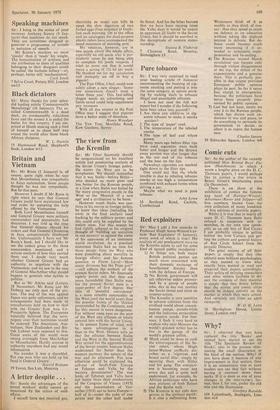The view from the Kremlin
Sir: Mr Tibor Szamuely should be congratulated on his excellent article and penetrating analysis of the Soviet Union's foreign policy. He warns the West not to be complacent. We should remember that it was Stalin—before Hitler— who decided on more guns and less butter for the Russian people, at a time when Stalin was hailed by the many progressive people in the West as the 'Messiah of a new age' and a civilisation to be born.
However much Stalin was cau- tious in his moves in foreign policy, he knew that ideas (including his own) in the final analysis need backing by the military power; and this could only be supplied by the nation state. For this reason he had rightly adhered to his original thought of 'building up socialism in one country' as against the views of his opponents of an imminent world revolution. As a practical statesman Stalin had no time for those people from the West who were preaching about morality in foreign affairs; and his famous question to Pierre Laval—'How many divisions has the Pope got?' —still reflects the outlook of the present Soviet rulers. Mr Szamuely rightly points out that they are more formidable than Stalin was; for the present Soviet state is a super-power of first degree. Her idea of 'peaceful coexistence' is a more saleable commodity in the West (and the world over) than the popular fronts of the 'thirties propounded by the Comintern, and for this reason is more dangerous. For without open eyes on the part of the West any alliance or treaty entered into with the Soviet Union, in its present frame of mind, will be more advantageous to it than to the West. History tells us that the alliance between Stalin and the West in the Second World War served for the aggrandisement of the Soviet empire, because Stalin understood far better than the western partners the nature of the war and its aftermath. For how otherwise could be explained the sell-out of South-East Europe at Teheran and Yalta by the western democracies? The war lords of Teheran and Yalta have not learnt from their predecessors of the Congress of Vienna (1815) and the peacemakers of Ver- sailles (1918) not to leave Europe— half of it—under the yoke of one power and the other half under its threat. And for the bitter harvest that we have been reaping since the Yalta days it would be unjust to apportion all faults to the Soviet Union, but it should be ascribed to the decrepitude of western states- 7 Clarence Road, Moseley, Birmingham 13

































 Previous page
Previous page